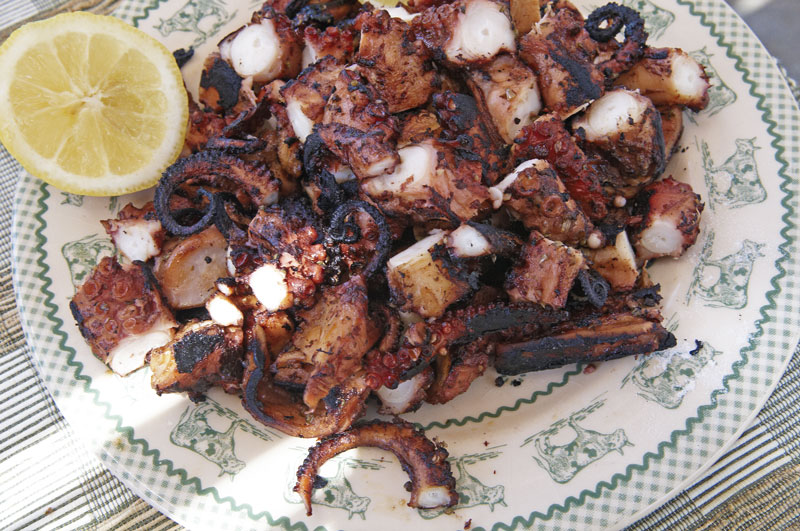Octopus, cuttlefish, and calamari replace meat during the forty days of Lent preceding Easter giving us one more excuse to enjoy our beloved cephalopods!

Schools close for two weeks for Easter in Greece, which we celebrate on May 1st this year. But when I was growing up Easter was the most frustrating ‘vacation.’ Theaters and cinemas were dark during holy week, except for the few that showed the Passion of Christ and other biblical-Hollywood films, which we ended up seeing repeatedly.
Most were low budget black and white movies, which my friends and I identified with code-names. One we called “the merci” because, although dubbed into Greek, Mary Magdalene in one scene thanked Christ in perfect French. In another of those movies, dubbed ‘the bicycle,’ an anachronistic two-wheeler was clearly visible traversing the background of the frame during the climactic crucifixion scene.
Later those films replaced regular programming during the early television years, together with boring talk shows, dated documentaries, and classical music concerts. In fact, for most Greeks not familiar with classical music –the vast majority up until the late ‘70s— Beethoven, Bach, and even Mozart, were considered funereal tunes. “Is it good Friday already?”, asked a plumber who came to my flat in Athens to fix a leak in the kitchen. I think I was listening to a Bach concert, and he was really perplexed that anybody could listen to such music without a looming crucifixion…
Not just church-going older Greeks, but many young people, who normally eat meat twice a day, may choose to fast during the holy week that starts on April 25 this year. They become temporary-vegans not so much for religious as cultural reasons — and recently to ‘detoxify’ themselves, as the word goes. Even the Greek McDonalds advertises Lenten ‘burgers’ made with seafood or beans.

Sesame halvah is the Lenten sweet par excellence, but I never really liked halva, or the tahini cakes my mother used to make, as I told Julia Moskin, who did the wonderful piece about halva’s revival in the Ney York Times. My Halva Semifreddo which was published with that piece, is not a Lenten sweet, but I am sure you will enjoy it!
Lentil soup, simply dressed with vinegar, was the traditional dish prepared for good Friday, but I propose a warm salad of mixed beans with garlic-lemon-tahini dressing, still within the rules of Lent, and much more interesting.
Octopus, cuttlefish, and calamari, our beloved cephalopods, together with shrimp and of course lobster, replace meat in the seasonal, one-pot family meals: cuttlefish stew with spring onions and spinach; octopus youvetsi, with orzo pasta baked with the octopus in a wine and tomato sauce — the seafood variation of the traditional lamb youvetsi— and even octopus stifado, a winter stew usually prepared with hare or other game, simmered in a rich sweet-wine sauce with pearl onions, scented with cinnamon and allspice. Octopus pie is another hearty, Lenten dish whose recipe I got from Cephalonia.

But undoubtedly the most popular Greek meze is charcoal-grilled octopus, which we always serve to our guests, while the spicy pickled octopus can be paired with a potato salad for a delicious spring lunch.
RECIPES:
Octopus pie, Pickled octopus, Mixed beans with garlic-lemon-tahini dressing
Also Halva Semifreddo (from the New York Times)